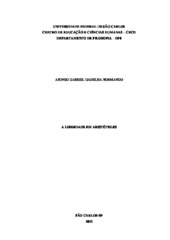| dc.contributor.author | Normando, Afonso Gabriel Gadelha | |
| dc.date.accessioned | 2022-10-27T12:42:08Z | |
| dc.date.available | 2022-10-27T12:42:08Z | |
| dc.date.issued | 2022-09-05 | |
| dc.identifier.citation | NORMANDO, Afonso Gabriel Gadelha. A liberdade em Aristóteles. 2022. Dissertação (Mestrado em Filosofia) – Universidade Federal de São Carlos, São Carlos, 2022. Disponível em: https://repositorio.ufscar.br/handle/ufscar/16946. | * |
| dc.identifier.uri | https://repositorio.ufscar.br/handle/ufscar/16946 | |
| dc.description.abstract | Several scholars have entertained the notion of freedom in Aristotle according to their respective aims and methods. Although their research may overlap in some aspects, they are significantly far from reaching any dialogue for discussion. Far from seeking a solution to this problem, the present study aims to analyze and consider the most common aspects of the freedoms in Aristotle and, thus, elaborate on its own specificity. It is primarily intended to investigate the Aristotelian concept of freedom and its relation to reason. Freedom firstly appears in the relations of the members of a household: The free should be governed as free people and the slave should be governed despotically. It is later found that what qualities underline these differences are some aspects of the human soul: The man has a complete deliberative faculty; the woman has it, but it is without authority; the child also has it, but it is incomplete; and the slave does not have it at all. If the freeman is the one who should rule for he has the faculty of deliberation, then, in order to define him, it is necessary to analyze the elements of the soul which make him the ideal ruler. The rational soul allows the freeman to calculate and to have a sense of time. Moreover, he is the only one who is able to deliberate, to decide and to have rational desires. His natural capacities allow him to act in a contingent world not as a slave, but as a freeman: Reason is his guide, not chance. Similarly, in politics, the true Aristotelian freeman should not act as he likes, as it is commonly done in extreme democracies, he should rather act according to the law. | eng |
| dc.description.sponsorship | Coordenação de Aperfeiçoamento de Pessoal de Nível Superior (CAPES) | por |
| dc.language.iso | por | por |
| dc.publisher | Universidade Federal de São Carlos | por |
| dc.rights | Attribution-NonCommercial-NoDerivs 3.0 Brazil | * |
| dc.rights.uri | http://creativecommons.org/licenses/by-nc-nd/3.0/br/ | * |
| dc.subject | Liberdade | por |
| dc.subject | Razão | por |
| dc.subject | Alma | por |
| dc.subject | Escravo | por |
| dc.subject | Lei | por |
| dc.subject | Freedom | eng |
| dc.subject | Reason | eng |
| dc.subject | Soul | eng |
| dc.subject | Slave | eng |
| dc.subject | Law | eng |
| dc.title | A liberdade em Aristóteles | por |
| dc.title.alternative | Aristotle's conception of freedom | eng |
| dc.type | Dissertação | por |
| dc.contributor.advisor1 | Lopes, Marisa da Silva | |
| dc.contributor.advisor1Lattes | http://lattes.cnpq.br/5427042421727621 | por |
| dc.description.resumo | Entre diversos comentadores, o tratamento da noção de liberdade em Aristóteles está a serviço de suas respectivas finalidades e métodos. Embora venham a convergir em alguns aspectos, a discussão, de modo geral, encontra-se afastada de qualquer diálogo. Longe de pretender uma solução para o problema, o presente estudo tem por propósito identificar as questões mais comuns entre as discussões e, assim, empreender a sua própria especificidade. Pretende-se, portanto, investigar uma noção de liberdade em Aristóteles fundamentada na razão. No domínio doméstico, a liberdade é evidenciada nas relações de autoridade entre os membros do lar. Aos livres cabe o mando dos livres e aos escravos, cabe o mando despótico. Aristóteles fundamenta tal diferença em suas capacidades anímicas: o homem possui a faculdade de deliberação desenvolvida; a mulher a possui, mas não tem autoridade; o filho também a possui, mas não é desenvolvida; e, enfim, o escravo não a possui. Desse modo, se o livre é o homem apropriado para o comando porque tem a capacidade de deliberação em sua forma mais completa, então, para defini-lo é preciso investigar quais elementos anímicos o autorizam para o governo. A alma racional, por sua vez, concede ao homem o cálculo e o senso de tempo. Além disso, ele é o único capaz de desejo racional, deliberação e decisão. Suas capacidades naturais, então, expressam-se em suas ações, isto é, no modo como o homem racional se relaciona com o mundo contingente: Cabe a ele menos agir ao acaso e mais agir segundo a sua razão. De modo análogo, no domínio da cidade, é papel do homem verdadeiramente livre suplantar a concepção anárquica de liberdade surgida nas extremas democracias e agir conforme a lei. | por |
| dc.publisher.initials | UFSCar | por |
| dc.publisher.program | Programa de Pós-Graduação em Filosofia - PPGFil | por |
| dc.subject.cnpq | CIENCIAS HUMANAS::FILOSOFIA::HISTORIA DA FILOSOFIA | por |
| dc.description.sponsorshipId | 88882.426663/2019-01 | por |
| dc.publisher.address | Câmpus São Carlos | por |
| dc.contributor.authorlattes | http://lattes.cnpq.br/8589062845458512 | por |


